|
-Kristy Burmeister- Then Jesus told them this parable: “Suppose one of you has a hundred sheep and loses one of them. Doesn’t he leave the ninety-nine in the open country and go after the lost sheep until he finds it? And when he finds it, he joyfully puts it on his shoulders and goes home. Then he calls his friends and neighbors together and says, ‘Rejoice with me; I have found my lost sheep.’ I tell you that in the same way there will be more rejoicing in heaven over one sinner who repents than over ninety-nine righteous persons who do not need to repent. – Luke 15:3-7 In 2012, I was in my early 30s, living in a new state, starting a new job, and raising two young daughters who were just getting old enough to ask questions about God. Although I’d severed ties with Christianity in my teens, I wanted to answer their questions responsibly, without exposing them to my own cynicism. They had the right to make up their own minds. I bought a couple of books and a Bible, just to give myself a little refresher. Around that time, someone added me to an online Bible discussion group on Facebook. When I joined the group, I made it clear that I had a lot of issues with Christianity. I was assured by the group that they wanted me there. 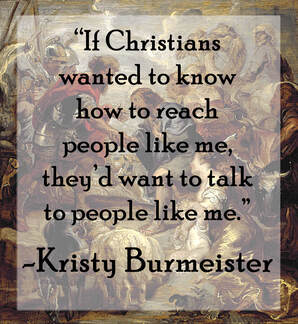 A few months later, we got into a discussion about ministries that reach out to the unchurched. As I was the only person in the group who was “unchurched” at that time, I felt I had a lot to offer in that conversation. If Christians wanted to know how to reach people like me, they’d want to talk to people like me. Instead, the discussion devolved into many of the group members complaining about new people coming into their churches and not following all the “rules”—both written and unwritten. They didn’t want to change anything about their worship services to make it easier for new people to join in. They didn’t want to do outreach to “those people” who might cuss or have tattoos. They wanted to sit in their clean sanctuary, sing the songs they liked best, and hear the pastor tell them what good Christian folk they were for following all the rules. I pointed out that not loving the unchurched enough to be uncomfortable wasn’t following the rules of Christianity. I brought up the Parable of the Good Shepherd. Shouldn’t every one of them want to bring that lost sheep home? No, they said. They wouldn’t leave the safety of the herd to go after one lost sheep. More than that, they didn’t want their pastor to go out there and find that lost sheep either. It was unacceptable for any church resources—including time—to be used on the lost. All the church’s resources should be spent on people who were already in the church. It’s important to point out that this group was mostly made up of fundamentalist evangelicals who believe you must be saved to get into Heaven. What they were effectively telling me is their own comfort was more important than my immortal soul. They didn’t want the likes of me in their churches. Sure, it was fine for me to be in some online group with them, but they didn’t want me in their church. I used to be in a church. I grew up in the Mennonite and Mennonite-Brethren denominations. I went to church every Sunday. I attended youth group every week. I led Bible studies both at church and at my high school. I came up with the plan to start a bi-weekend youth service as an outreach program to our town, which we did. I went on short-term mission trips. I saw my friends at the pole. I signed a purity pledge. I followed every single rule, and then some. When I was eighteen, a middle-aged man from my church began stalking and threatening me. It got so bad, I had to stop attending my church in order to avoid him. My church council refused to ask that man to attend somewhere else, so I had no other option. 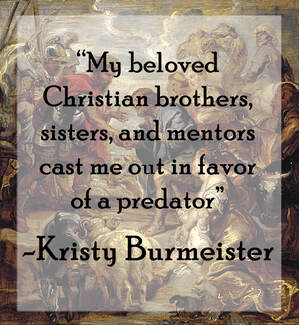 My beloved Christian brothers, sisters, and mentors cast me out in favor of a predator. It didn’t matter that I had been everything they wanted me to be. I had more than fulfilled every expectation. The hard truth was that my situation made them uncomfortable, and they didn’t want to face that discomfort. If I just quietly stopped attending, the whole problem could be swept under the rug. No need to change anything. They could go about business as usual. That damaged me more than the trauma of having my life threatened. We all know evil is in the world. I could have coped with knowing one man wanted to do evil to me easier than dealing with the cognitive dissonance of knowing the same people who claimed to love me, who had witnessed my baptism and welcomed me as a full member, who I knew to be “good Christians” threw me under the bus so they wouldn’t have to do something that made them uncomfortable. I’ve repeatedly gotten the same message from Christians: We don’t want you. You have no value to us beyond an attendance number. Not only do they not want me, they don’t want to listen to me. They all want to believe they’re the type of Christians who would have stood up to my stalker, but if they’re the type of Christians who aren’t willing to face some uncomfortable truths about the church, how could they have? People who are still inside the church want to know why attendance has declined. They ask, “How can we reach the unchurched?” But as soon as one of us speaks up, they put their hands over their ears. I’m literally right here, telling you how to fix this, but you don’t want to hear it. You don’t want to hear it because it requires you to change and act. A couple of years after that Facebook group dismissed people like me, I met Rev. Melissa Fain in a different online community. I read some of her posts on Fig Tree, and she struck me as someone who might understand. Then she did something that blew my little unchurched socks off. She asked me to contribute to an Advent devotional. Here was an actual pastor, and she wasn’t just saying, “Hey, I want your body to take up space in the church so we can show we’re growing.” She wasn’t even asking me to join anything. She wanted to hear what I had to say. She valued what I had to say. As I wrote in my memoir about my traumatic experiences within the church, that was the first time since I’d been forced to leave my childhood church that I’d felt wanted by Christians. Not tolerated. Wanted. Valued, not as a number, but as a person who had an important perspective the church should hear about. We like to look at people outside the church as projects. We’re going to bring them into the church and save them from all their misery. You’re not going to save people like me. You don’t even actually want us, evidenced by how little you’re willing to flex to reach us. But we could save you, if you let us. -Jessica Nettles- Pastor Melissa and I were chatting a few days ago about how the church treats those who it has “broken.” She’d asked me to write this piece, and I wasn’t sure how to proceed. She said something that struck me—“Right now, there is a ghosting of those who are broken by the church.” My first thought was that it wasn’t just right now. This has been happening for decades. Ghosting is a term that means “breaking off a relationship by stopping all communication and contact with the partner without any apparent warning or justification, as well as ignoring the partner’s attempts to reach out or communicate” (Wikipedia). What’s sad is that this sort of activity is built into the culture of many churches and the members accept that this is how things work in a church community. I’ve heard members say, “Well, they decided to leave.” While this may be true, if the church is the family it claims to be, then the church should be willing to face problems and deal with them honestly rather than placing blame, ignoring those sharing concerns, or using people until they have nothing left to give the church. It should also be willing to reach out to the person and find out why the person felt they had to leave the community. The point of Christianity is to honor God and take care of one another (this can mean inside the church and in the community). Many churches have devolved into organizational care taking i.e. what can our membership do to keep us going? How can we grow our membership to keep us going? This means that membership becomes a tool rather than a community or family. It can wear the mask of family and community, but underneath that smiling mask is something that is disturbing. I have watched and experienced the ghosting that stems from this attitude for years. 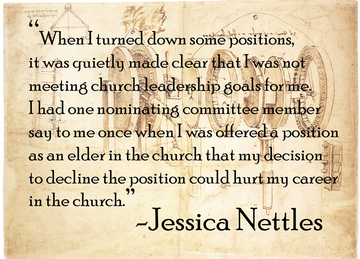 Before I tell you about my departure from church, I need to make something abundantly clear. The church did not break me. It failed me by using me till I was exhausted and had enough. I believe service to others is part of the Christian lifestyle. It is the best way to honor God. When an organization uses that belief in service to simply grow itself and raise funds to help itself without reaching out to others outside the church or to care for the wounded inside the church, that’s not Christian service to others. There is a saying that the church eats its own. I have seen this in action and the “eating” comes in many varieties. About nine years ago, I left a congregation I’d participated in for twenty years. Participation means I held positions in the church, worked on church things after I got off my real job, pulled my kids around as I did those jobs because that’s what I saw as service (I often couldn’t tithe monetarily and instead would do a time tithe, so my service was a tithe). Sabbath was not a rest day for me. I’d hit the ground running on Sunday mornings. This meant getting the kids together, driving to church, and working at various jobs before, during, and after services. This also meant extra time after services attending meetings and going places. There was no rest, and Sundays were driven by stress and anxiety a lot of times. I wanted to do other things, sometimes with my kids, but I had obligations. I even worked at home for the church. It was like having another job. When I turned down some positions, it was quietly made clear that I was not meeting church leadership goals for me. I had one nominating committee member say to me once when I was offered a position as an elder in the church that my decision to decline the position could hurt my career in the church. When I burned out (which was inevitable), there was nothing offered in the way of help or comfort. Instead of asking why or understanding my exhaustion, the response was “we need your wisdom and skills for this or that,” or “how will we do this without you?” or “there are so few of us working now.” Saying no was hard because it felt like I was saying no to God herself. I knew She understood when I said no, but I also knew that the church measured my worth to the community by how much I contributed in time. In the six months to a year before I walked away never to return, the congregation was more concerned with keeping the doors open than taking care of their own or the community. Now, to be fair, I understand how hard it is to make sure that a church pays its bills and is able to fund what it does. While a congregation pays attention to those matters, it would seem that someone would make a connection between that lack of funding and the on-going interpersonal problems that have led to this lack of funds. 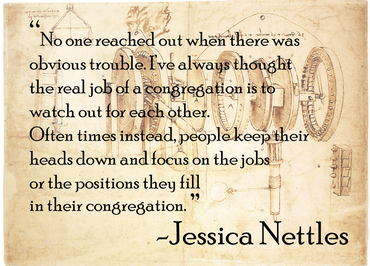 Often, no one would have any idea why a person left the congregation. In one instance, an entire family that served on our board and were elders and deacons left the church. They’d raised a few generations of kids there. When they left, no one went after them, and when I asked what had happened, the leaving was blamed on them (later I discovered that the departure was, in part, because no one wanted to listen to them when they advised against a major step the church board decided to make even though the advice was sound). There were even times when people were going through major family issues and no one would reach out or know what was going on until the troubles were over. In my own case, the church had no idea that my ex and I were having marital problems even though we argued and barbed each other for an entire year or so in Sunday school. My ex was a minister (we left the United Methodist Church after serving as a pastoral family for seven years) and very charming. People thought we were the “it couple” in the church (probably because of our provenance). When I announced that we were splitting, people were shocked. They had no idea. In fairness, there were members who immediately supported and surrounded me and the kids once they did know, but the fact that no one saw that there were deep problems with our relationship was strange to me. For a long time, I told myself that it was because we’d managed to build good masks and were able to pretend that we were okay. I certainly didn’t go to anyone and say, “My husband is emotionally abusing me.” Still, there were signs, and no one pulled me aside and said a thing. They pulled me aside when I was pregnant with my son and asked, “Are you pregnant?” but they didn’t seem to see when I’d come to church with puffy eyes from crying in the car or notice when I got more quiet than normal. I observed this kind of behavior over and over again with various people and situations. No one reached out when there was obvious trouble. I’ve always thought the real job of a congregation is to watch out for each other. Often times instead, people keep their heads down and focus on the jobs or the positions they fill in their congregation. Before I left, the congregation’s problems were growing. They couldn’t let go of a former pastor. They hired two pastors in a row who were toxic. The entire youth department left the congregation because they felt that the adults who they trusted wouldn’t support them when they brought their concerns about the pastor to the congregation. An entire youth department was ghosted because no one wanted to admit that a pastor was toxic. Instead of focusing on the issues that were causing the problems, the board would cycle. There’d be a committee formed and then a big kickoff party where the renewed mission statement would be revealed. Then there would be a series of sermons meant to light the congregation’s fire to work again. The same people (unless they’d left), would pick up the work even without real money to do so. The people who made a stink would either leave or be ghosted until next time around. Same song, different verse, same results. My decision to leave wasn’t a sudden decision. I began my leaving at the point where I sat in services and couldn’t see God for all the stuff cluttering my worship space. I don’t just mean the giant screens, meaningless worship chants, and the sermons with little to no value because those who delivered them were toxic. The burn-out and ghosting also clouded my view of God. Sitting in services became unbearable for me. When my kids said they couldn’t go back, I understood. I resigned from my jobs in an attempt to find peace. Then I found that I wanted to spend that time with my kids who were on the verge of leaving the nest. I left and tested a theory. After three weeks, no one from the church contacted me. After three months, still nothing. I had been on the board for years in some capacity. I’d been a deacon for years. I headed education for a while and even wrote for the church’s website and Facebook page. My children grew up in that congregation. No one came for me or my children. This hurt a lot, but it also solidified my theory that my work was valued more than my family or myself in that community.  Once again, after all of this, I don’t consider myself broken. The church burned me out, but I didn’t break. I shifted. When I began thinking about this piece, this was the first thing that hit me. This led me to thinking about how planets rotate on their axels. For the record, I’m not an astrophysicist. I’m a fiction writer. Still, I am fascinated by space and how things in the universe work. All planets rotate around their sun (or suns…yes, there are really planets with two suns), but they also spin on a magnetic axis. This is why we have seasons, and why we have sunrise and sunset. What’s even more cool is that the axis itself spins as well. This spin is influenced by the gravitational pull of the sun and moon in the case of Earth. Astronomers talk about this using the term “axial precession.” Axial precession is “a gravity-induced, slow, and continuous change in the orientation of an astronomical body's rotational axis.” Focus on the “slow and continuous change in…orientation” bit. During my time in the church, even when I was ghosted, I wasn’t really broken. I was shifting. No one saw this shift but me and my closest friends (who, sadly, weren’t in the church). My rotational axis was changing. When I left, I was no longer being pulled by the gravity of the church. Some church folk would label this “backsliding” (my Baptist is showing here). To be clear, my love of God did not change in this shift. My desire to serve my community and take care of others did not shift. The only thing that shifted was my connection to the church. In my axial precession I found something I’d not found in a very long time in my life—freedom. I’ve learned to choose my obligations and not be afraid to say no if I cannot, even if that “cannot” equals “I don’t have the personal energy for that obligation right now.” I’ve found connections with people who respect, listen, and come after me if there is a problem. I’ve found church in other spaces and with people who I love. It’s too bad that the place and people who call themselves church often do none of these things for their members. There is a huge discussion right now in many denominations about what is killing their churches. The answer staring them in the face, but I’m not sure anyone will look to see the truth. It means that they have to do something different than they do now. I don’t think they are ready for that. -Tim Holm- Jesus replied: Philip, I have been with you for a long time. Don't you know who I am? If you have seen me, you have seen the Father. How can you ask me to show you the Father? – John 14:9 Perhaps nothing is so frustrating as straining to be understood and the person you want to connect with just doesn’t get it. Several months ago, a dear friend and I got into an hours-long disagreement about how we perceive the world. Eventually we uncovered that we didn’t even mean the same things when we used even basic words. This week we are spending time together again, and he brought up that conversation. “I’ve thought of that conversation many times,” he remarked, “and I still don’t get how you could possibly see the world that way.” The distance such basic missed connections creates can be enormous and painful. Today, I visited a black history museum in a small Southern city. Its exhibits included receipts for poll taxes, photos of civic leaders who battled segregation, and clippings from black-owned newspapers. I was reminded again that this community of hope and strength which endured – and endures – pervasive systemic and personal oppression is one that I may learn about and appreciate, but that I still do not know, do not understand from the inside-out. I don’t “get it.” God, in Jesus Christ, identifies with all of us from the inside-out. Jesus is the exalted one who took the form of a slave and was willing to suffer a humiliating, painful death. The Spirit of God not only sees all of us but participates with all of us, grieving in our suffering, mourning for our sin, rejoicing at our feeble but brave efforts to resist evil and follow Christ. The folks least like me, God sees and knows them, from the inside-out. Unlike me, Jesus “gets it.” Maybe that is why it is so hard sometimes for me to get Jesus. We can spend years at his feet, but until we join Jesus as he feasts with the ones we don’t get, we will never get him either. Let us pray: Unknown God, guide us into a more perfect knowledge of you as you guide us into a more perfect love for our neighbor. Give us grace that we may know you and one another inside-out. Amen. Tim Holm is a former high school teacher and pursuing an MDiv from Duke Divinity School. He has only had to bribe his way through a Russian airport twice.
-Rev Jamie Brame- Don’t you know that all the runners in the stadium run, but only one gets the prize? So run to win. Everyone who competes practices self-discipline in everything. The runners do this to get a crown of leaves that shrivel up and die, but we do it to receive a crown that never dies. So now this is how I run—not without a clear goal in sight. I fight like a boxer in the ring, not like someone who is shadowboxing. Rather, I’m landing punches on my own body and subduing it like a slave. I do this to be sure that I myself won’t be disqualified after preaching to others. 1 Corinthians 9:24-27 CEB  I spent my college years visiting a small monastery and soaking up the wisdom of the monks. These monks looked like anyone else: flannel or work shirts, jeans, sneakers; some had hair to their shoulders, others wore short hair. The only time they wore robes was when we went to church for the prayer times. Not stereotypical monks! Because of their influence, I would go to the church I served as a student minister and talk to the youth about prayer and what the monks were teaching me. “Can we go to the monastery?” I asked the monks, they said yes, so 20 of us went there one afternoon. After a tour, Brother Jim walked us to the big field, and sat cross-legged on the ground. My group saw him getting into a meditation position and did likewise, closing their eyes and sitting quietly for 15 minutes. Then Jim opened his eyes and said, “Any questions?” “Brother Jim, how long should I pray each day?” I was so proud of the questioner (my similar question to Jim earlier drew the answer about 20 minutes a day three times a day). Jim answered, “Three minutes a day.” I could see the relief as it registered to my youth that a disciplined prayer life was in reach! But I was shocked. Talking to Jim later, I asked him why the difference between his answer to me and to them. “Well, you’re planning on being a professional, aren’t you? Takes more work!” Disciplined spirituality takes practice. We don’t run five miles the first time we run, and we don’t pray for hours on end at the beginning. We don’t become Christian and do all things correctly. Like an athlete, we practice, we set our goals, and we move towards them. Some will do more, some less, but all of us have the goal of being close to God and living a meaningful life. - - - God, give us strength to keep going, to keep trying, in Jesus’ name, amen.  Rev Jamie Brame is the Program Director at Christmount Conference and Retreat Center, located in Black Mountain, NC. He has served there for over 27 years, working with both youth and adults. His interests include the study of spirituality and prayer, with an emphasis on eastern spirituality and its application in a Christian context. In addition to his ministerial vocation, he is also a musician who performs with his wife, Renae. He holds an M. Div. from Duke Divinity School and B.A. from Atlantic Christian College (now Barton College.) -Rev Sarah Renfro- Put on my yoke, and learn from me. I'm gentle and humble. And you will find rest for yourselves. My yoke is easy to bear, and my burden is light." Matthew 11:29-30 CEB  "Come to me, all you who are struggling hard and carrying heavy loads, and I will give you rest,” Jesus tells those who have been bearing the burdens of living under an oppressive regime, a nation at war, and religious leaders who impose a strict interpretation of scripture. Their lives were hard, and Jesus offers them another way to live. So many around the world suffer under such cruelty, poverty, and unrest, that they are willing to sacrifice everything they have in order to escape the abuse. They have been treated like captives for too long, and they wish for a better life. These are the people Jesus is speaking to in our time. He exchanges the yoke of oppression for one of education and calling. He promises to lead with a gentle hand, not an iron fist. Those who have been unable to get a good night’s sleep for years due to insecurity will be allowed to close their eyes in the presence of the Lord. Following Jesus’ teachings does not lead to an easy life, but it is easier to bear, because we share each other’s burdens. The weak are lifted up by the strong. When life’s experiences way us down, physically, mentally, emotionally, spiritually, Jesus will help us lighten our load. The way of discipleship is not burdensome, but life-giving. Our hearts may be heavy, but only because we are yoked to the heart of God, full of justice, mercy, and compassion. When our souls ache, we may find comfort that we rest in the grace of God, who took on flesh in the form of Jesus, who frees us from conformity and sin. Jesus is firm, yet gentle, in his humble way. He doesn’t pretend that the world is all rainbows and unicorns. It isn’t. But for those whose mountain is too steep to climb with such heavy packs on their backs, Jesus allows others to shoulder the suffering, for respite and relief. - - - Gentle God, some of us are suffering under the weight of the world. Others of us feel like we can move mountains. Invite us to share one another’s burdens, lessen each other’s loads, and rest in the One who guides us. Amen.  Rev Sarah Renfro is the Pastor of Family Ministries at Geist Christian Church (Disciples of Christ) in Fishers, Indiana. Born and raised in Lexington, Kentucky, Sarah formerly modeled internationally, was ordained into ministry in 2010, is married to Rev. Kyle Brown, mother to Miriam, March Madness fanatic (Go Big Blue!), and writer at m-bodied.com. Her ministry includes leading body image workshops and preaching on embodiment and faith. -Rev Evan Dolive- Faith is the reality of what we hope for, the proof of what we don’t see. Hebrews 11:1 CEB  Faith is a tenet of Christianity that can take on many different forms. If you were raised in the church or even if you became a follower of Christ later in life, the notion of your faith or having faith was more than likely a topic of conversation. In a world filled with facts, figures and needing proof before we believe a YouTube video has the notion of faith been lost? This notion of faith is showed when Christ teaches the disciples that faith of a child is needed to enter the realm of God. This one simple teaching of Christ has turned into just taking things at face value but by subscribing to this mentality I believe we are selling ourselves short. Children’s faiths are alive and strong, and the church needs to recognize this instead of repeating corny “children’s sermons” that are usually well intentioned but often developmentally inappropriate. The church’s story is being heard and lived out in front of our eyes through the hands and feet of some of the smallest members of the church. Why are we amazed that more children are asking to give money or toys to others instead of receiving for themselves? This is something that should be an extension of our own faith; sometimes it takes the innocence of a child to reorient our thinking about what truly matters. We don’t give children enough credit. They are infinitely smarter than we think. Children figure out things that most adults have trouble comprehending. I truly believe that my daughter came out of the womb knowing how to operate an iPad. She gets that finger swiping and she can navigate the world of apps and photos with more precision and understanding that people 20 times her age. Having faith like a child does not mean that we take everything at face value, but it does mean that we have the ‘go-get-em’ attitude. Children’s faiths are constantly being shaped and formed by the people around them and by the answers they get to important questions. If we cannot articulate our faith in a way that a child can understand, then we have a failure in communication. I want to have a child’s faith; I want the stories of the Bible to be more than just words on a page or the same old story. I want to be emboldened in my faith to step out and be the hands and feet of Christ in the world around me. And if I can do that, I know that I will have a partner in ministry with me. This Lent let us hold to our faith and examine it; may this time of contemplate and prayer allow us to experience God anew as well as deepen and strengthen our faith in God and Christ. - - - Help me O God to have faith like a child, innocent and wondering. May your spirit dwell within me in Lenten Season. Through Christ I pray, Amen.  Rev Evan M. Dolive is an ordained minister in the Christian Church (Disciples of Christ). He currently serves as the Associate Minister for Family Life at First Christian Church (Disciples of Christ) in Longview, Texas. He is the author of "Seeking Imperfection: Body Image, Marketing and God," a theological examination of marketing and body images propagated in the world today and the Christian response. He also writes for various online publications and at evandolive.com He is currently working on his Doctorate at Brite Divinity School at Texas Christian University in Fort Worth, TX. He is married to his high school sweetheart and has three children ages 6,4 and 2. -Mike Miles- Instead, love your enemies, do good, and lend expecting nothing in return. If you do, you will have a great reward. You will be acting the way children of the Most High act, for he is kind to ungrateful and wicked people. Be compassionate just as your Father is compassionate. “Don’t judge, and you won’t be judged. Don’t condemn, and you won’t be condemned. Forgive, and you will be forgiven. Give, and it will be given to you. A good portion—packed down, firmly shaken, and overflowing—will fall into your lap. The portion you give will determine the portion you receive in return.” Luke 6:35-38 (CEB)  When I think about kindness, I think about Doris. Doris is an elderly woman at my church where I previously ministered in Iowa. She has a smile about her that brightens any day. For me, she is the embodiment of kindness because of how much she does for others without ever asking for anything in return. She has been retired for decades now, but continually keeps busy serving the people of her community. Though health problems have limited her recently, she still devotes countless hours visiting people in the hospital, holding Bible studies in various nursing homes, and working with children through the local 4-H program. Here’s what strikes me about Doris: she often serves people who can offer nothing back. Some literally have nothing. Others don’t realize what she’s doing because she does them in secret. Some aren’t grateful even if they do know. Doris gets nothing out of all of the time, energy, and work she puts into the week…and yet, she continues on relentless. Why? Because Doris is kind. Doris is a child of God. In the passage above, Jesus talks to his disciples about what it means to be children of the Most High: love your enemies; do good; lend expecting nothing in return; be compassionate. These are all things that God does for all people unconditionally, regardless of who they are. “God is kind to ungrateful and wicked people.” What a thought! As bearers of the divine image who have been made in His likeness, this is how we too should be. As people who are followers of Christ, we are called to imitate the life of Christ, including his kindness. The standard for our behavior is in the character of God himself. Not only do we experience God’s kindness, but we demonstrate it to the world. Kindness is found in the heart and attitude of Christ. As Paul writes in Philippians 2:3, “Don’t do anything for selfish purposes, but with humility think of others as better than yourselves.” The “others” he speaks us are not only those whom we get along with and whom we call friends. Consider even your enemies as better than yourself. When we look to the interests of others instead of our own, we find the power within us to be kind even to those who do not deserve it. In these kind acts, it is not about what we are to receive or “get back” from doing them. It is about the act itself and the good that it does in this world. In a world that is so often focused on the “bottom line” and investments and returns, practice the kindness that expects nothing back. To paraphrase Jesus elsewhere, let the kindness of God be reflected in your life, so that when others see your good deeds, they will glorify your Father in heaven. - - - Father, we praise you for your kindness. You have demonstrated to us your goodness, even when we were still sinners. May your Spirit be at work in us to demonstrate kindness to others in a godly, unconditional way. Amen.  Mike Miles is the student and family minister at the Livonia Church of Christ in the western suburbs of Detroit, Michigan. He attended Abilene Christian University, where he obtained his Bachelor of Arts in Christian Ministry in 2009. Mike is currently working on his Master of Religious Education in Missional Leadership at Rochester College in Rochester, Michigan. Mike has a love for community and for bringing people together, especially across society's dividing lines. Born in the Philippines, he has since lived in over twenty different places but happily calls Michigan "home." He is unashamedly nerdy. He has tried to maintain a blog for years, but has decided that he is just too lazy. He is married to Blythe and has a son, with a baby girl on her way in early 2017! -Rev Rebecca Yowler- Let’s not get tired of doing good, because in time we’ll have a harvest if we don’t give up. Galatians 6:9 CEB  One of my favorite things to say is, “Patience is a virtue, but it isn’t one of mine!” This is probably the truest statement I ever make. I am NOT a patient person. I try so hard! I try to wait—to do what is right and know that things will eventually work out. I try to trust that I will eventually “reap a good harvest.” But, darn it, I want that harvest NOW. This section of Galatians also contains the phrase “you reap what you sow.” This, to me, is the biblical equivalent of Karma—the idea that what you put into the world comes back to you eventually. If you do bad things, eventually the bad will return. If you do good, then eventually good things will come to you. This is all well and good, except it’s the WAITING that gets me every time! I want karma to do its thing and I want it done, now. Actually, I’d prefer yesterday. Nowhere in my life has this been more apparent than my recent job search. I had spent two AMAZING years at a fantastic job and had been heartbroken to leave it. I had done all good things there and had the support of so many people as I moved to another state and started my search. And the job just wouldn’t come. The “perfect job” fell through, a Skype interview went less than perfectly, another “slam dunk” never materialized, and yet another “I would give anything to work here” type position completely vaporized. Everything from God kept saying “be patient,” and “wait.” Every hymn, every poem, every homily, every bible verse—EVERYTHING told me to wait. But I didn’t want to wait. Finally, months later, a pretty darn close to perfect job came along, and I knew what I had been waiting for. Did I learn my lesson this time? Did I learn to trust God and wait for the harvest? I wish I could say, “yes.” I wish I could. But, I know myself better than that. I know that patience isn’t one of my virtues and that I am not good at waiting. So, instead of getting angry at myself or trying to figure out how to be more patient, I just pray more. I simply ask god to help me be as patient as I am capable of being and to continue to remind me that waiting is necessary. Even if patience can’t be my virtue, I can work on it…little by little…and keep on praying for more help. It’s the best I can do. - - - Dear God, please help me be patient. And if I can’t be patient, help me wait with as much grace as I can muster. And if I can’t do that, help me to not make any poor decisions in the meantime. Amen  Rev Rebecca Ann Yowler is an ordained Disciples minister and an academic librarian. She is currently adjunct faculty at Valparaiso University. She is passionate about pugs, knitting, and figure skating. You can read her occasional sermons and devotions at www.beccassermons.livejournal.com -Kristy Burmeister- In the same way, I tell you, there will be more joy in heaven over one sinner who changes both heart and life than over ninety-nine righteous people who have no need to change their hearts and lives. Luke 15:7 CEB  Joy is a slippery word. People often use it in place of happiness, but joy is so much more than feeling happy in the moment. Joy is something you feel with your whole heart. It fills us up. The verse above doesn’t say there will be people in Heaven who say, “Another sinner has changed his heart and life. Well, that’s nice.” There will be joy. Heart-thumping, fist-pumping, shout-out-your-excitement joy. If a changed sinner receives that sort of recognition in Heaven, what sort of recognition should they receive on Earth? Shouldn’t we welcome them with the same joyfulness? It’s easy to pat a new convert on the head, hand them a cheap Bible, and say, “Well, that’s nice. Make sure you read Romans.” But where’s the joy in that? Where’s the influence of the Holy Spirit in that? Instead, we should be willing to open ourselves up to joy. If a person has changed both their heart and their life, they’ve done something amazing. How many people manage to pull off something like that? Let’s recognize these transformations for the miracles that they are and rejoice alongside our new brothers and sisters. - - - God, Please open me up so that I can experience joy. Help me to reflect your divine joy as I interact with others. Amen.  Kristy Burmeister writes about stalkers, church-related trauma, feminism, and pie (pretty much in that order) at kristyburmeister.com. She's currently working on a memoir about a church that almost got her murdered when she was a teenager. (Spoiler: She's still alive.) -Rev Myra Torance- God so loved the world that he gave his only Son, so that everyone who believes in him won’t perish but will have eternal life. John 3:16 CEB  For me the word “love” is a verb; an action word. Far too many are the people who believe and take for granted the word “love.” True, real love takes patience, and faithfulness. It is not easy but when you finally believe; it is the easiest of action verbs to live. Example: I wrote to a young man in the army stationed in Vietnam. For over a year I wrote him a letter every day. Well to be honest, for two of those days my mother sent him cards because I was sick with the flu. We did it because this way when they had mail call he always had mail! Every week I sent him a box (5 lbs) filled with chocolate chip cookies. Now, there is a lot more to this story in the background, but that is for another time. Anyway, this man, in a letter, asked me to marry him and I accepted; without ever having seen a picture of him. When he was discharged he flew to a nearby airport for me to pick him up. I had heard his voice over a telephone once. I was twenty years old, never had a date, but our love grew from letters and chocolate chip cookies. I asked him how I would know who he was and he stated, “I’ll be the one in uniform.” Imagine my surprise when five gentlemen in uniform came forth from the plane? We had a hard but beautiful marriage for 44 years and then his fight with cancer won and he went to God. I miss him every day of my life, but the love we shared gave me 4 children and 9 grandchildren. God sent Jesus to teach us what love is and he lived it every day of his short life. What he gave is a gift we should always cherish. From a stable to a cross he lived love. This season of Lent I pray you do also. - - - Jesus, lover of my soul, sing in my heart, so that I may shine your love into the world. Amen.  Rev Myra Torrance is the pastor of Chelan Christian Church, where she has led the congregation for four years. She has been a pastor in the Disciples of Christ Christian Church for over 35 years. Prior to being called to the pulpit, she was the Executive Director for Hospice in Vincennes, Indiana. Myra is originally from Vincennes, Indiana, where she raised her four children with her husband, Bud, before his passing in 2011. Myra loves to write and enjoys time with her two Chihuahuas. |
Categories
All
Archives
October 2023
|



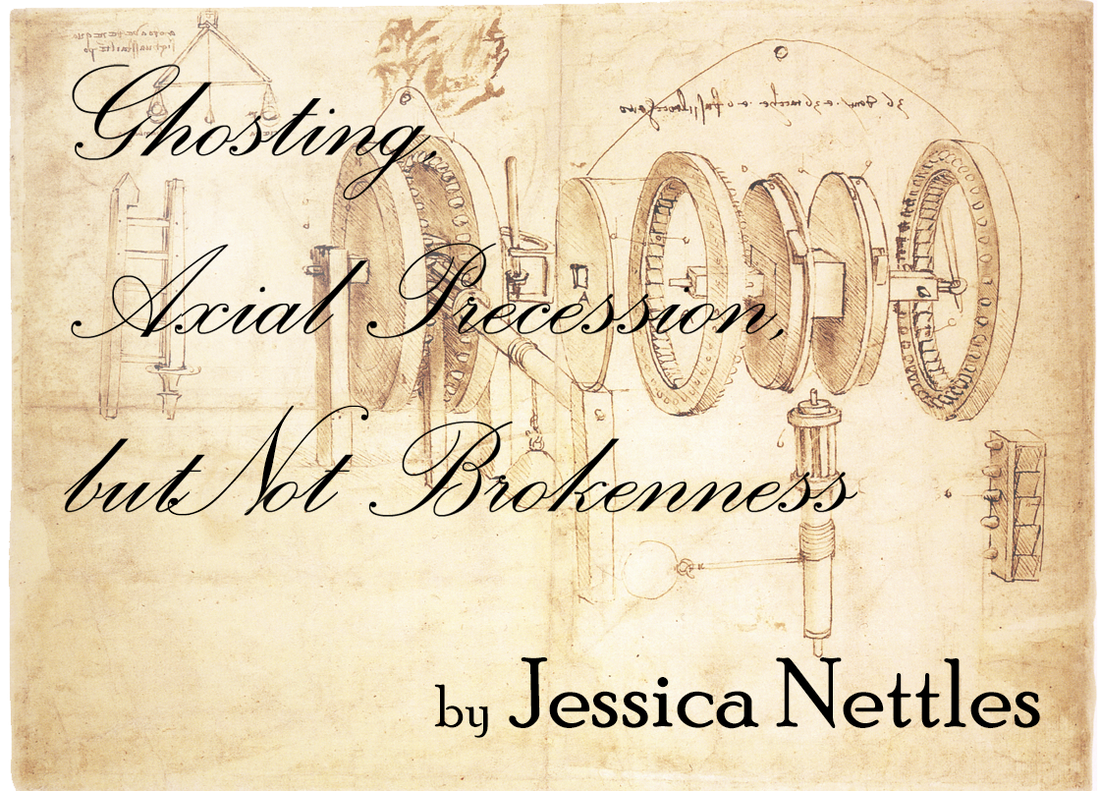
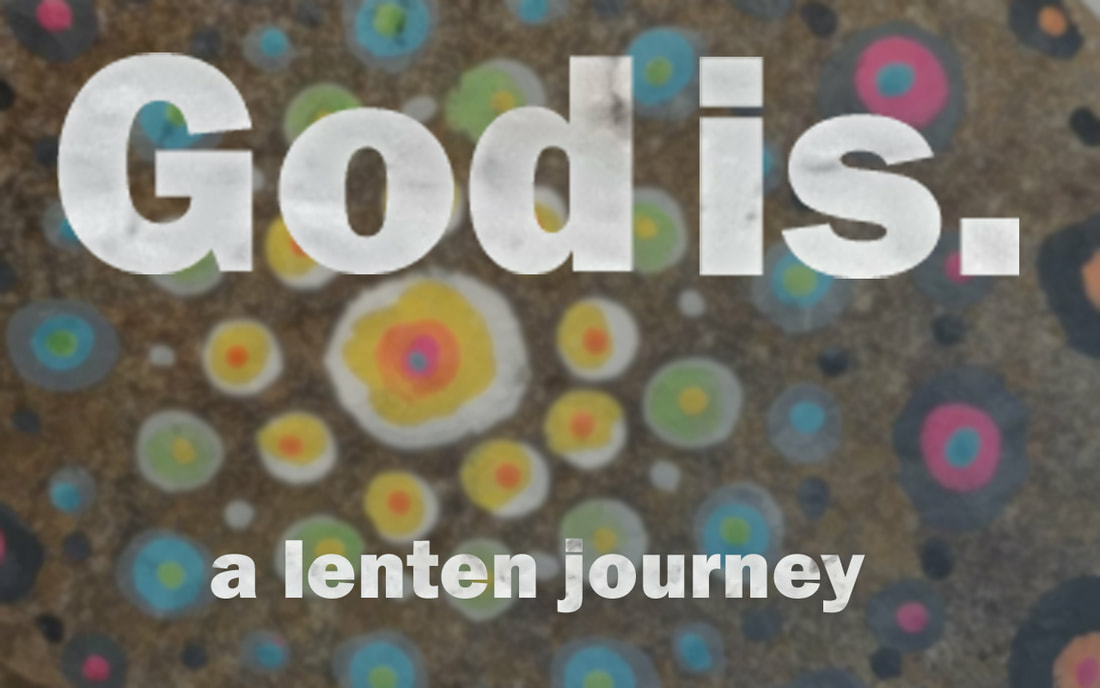
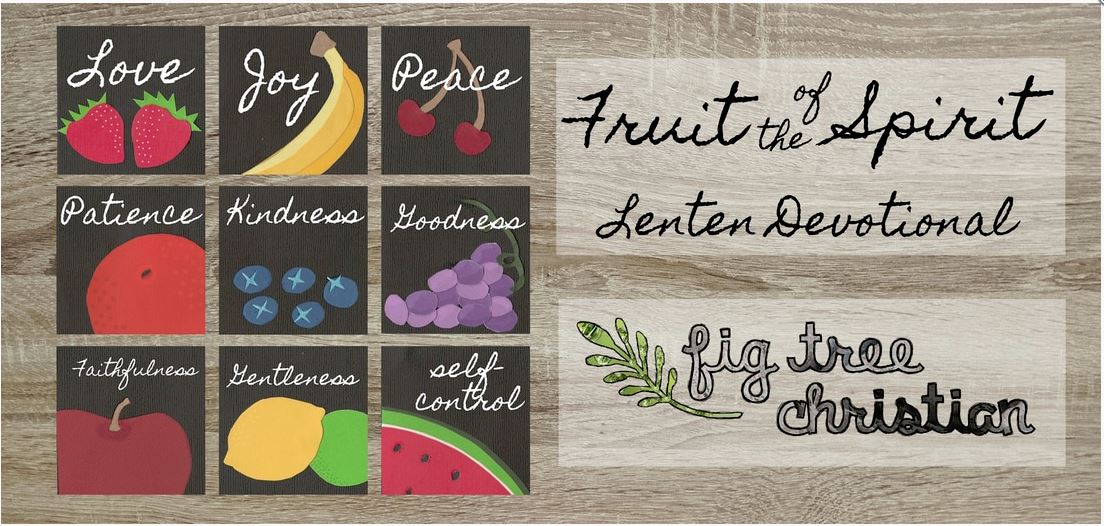
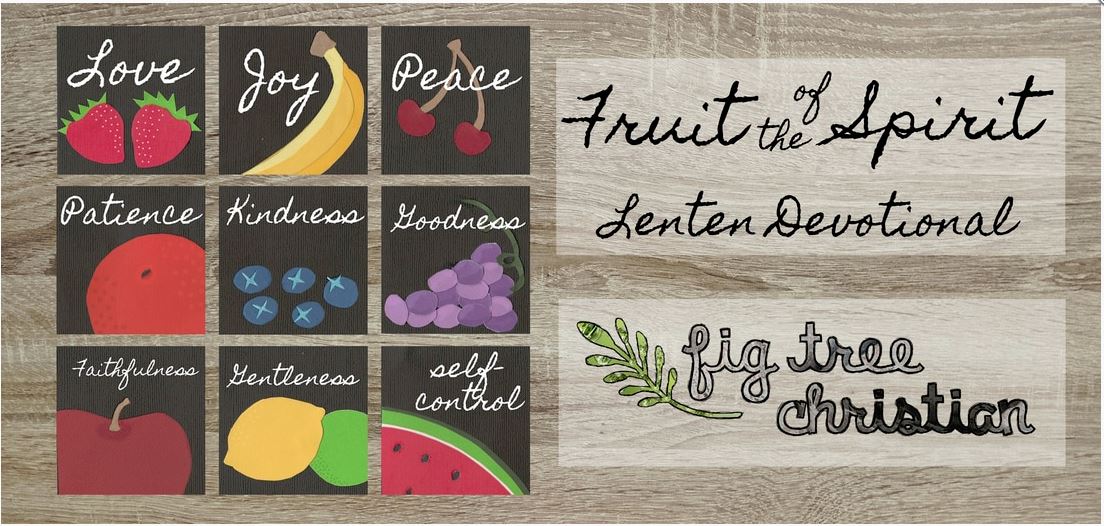
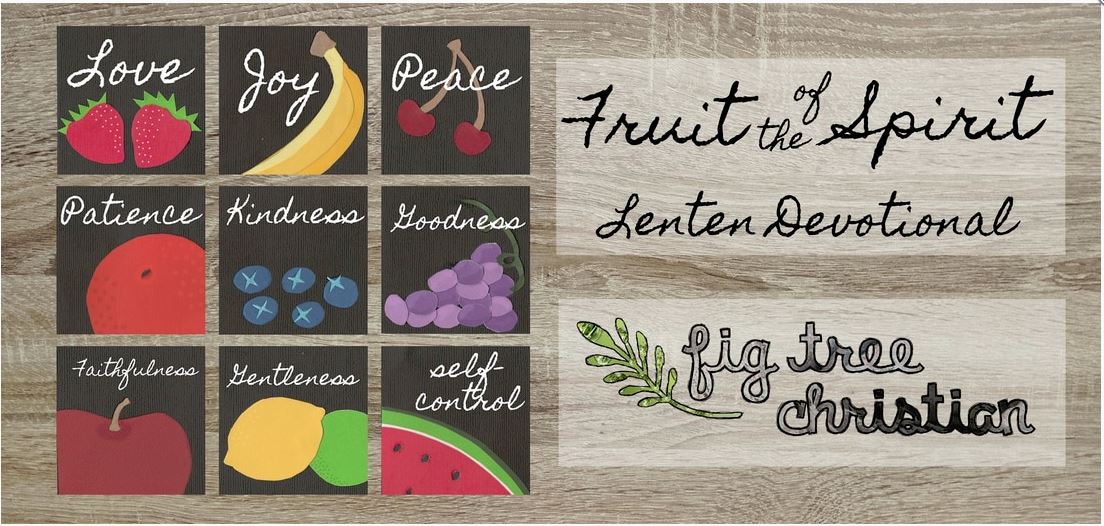
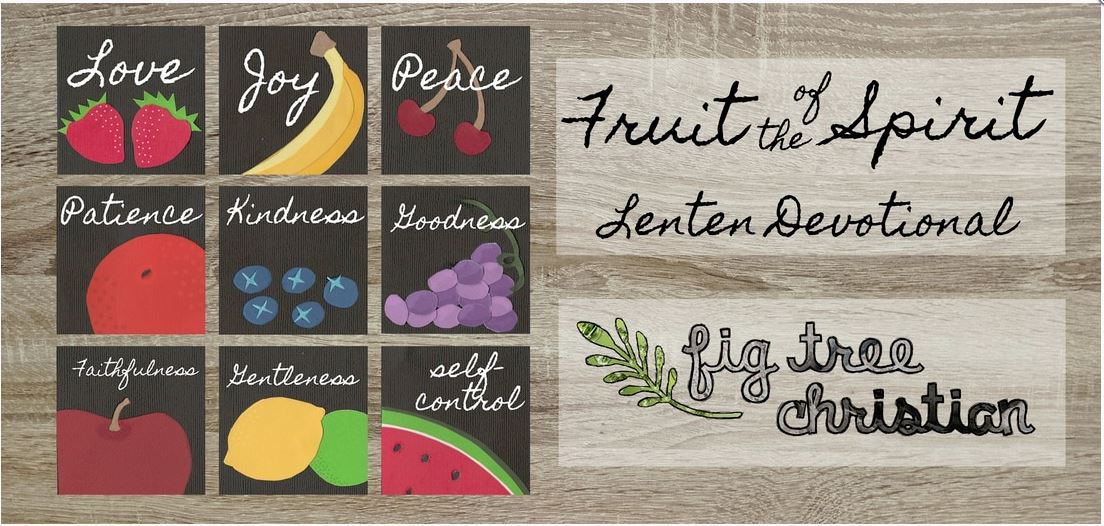
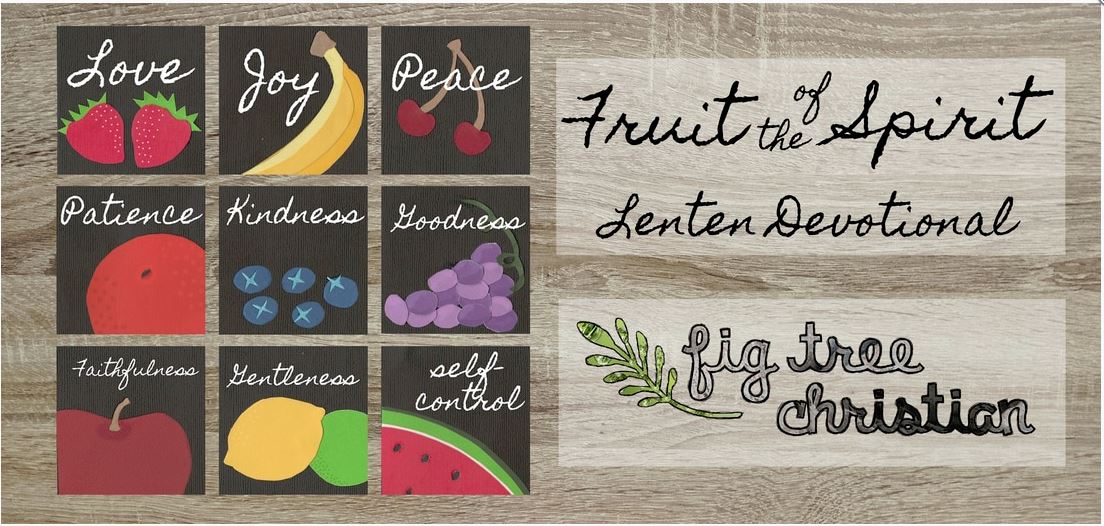
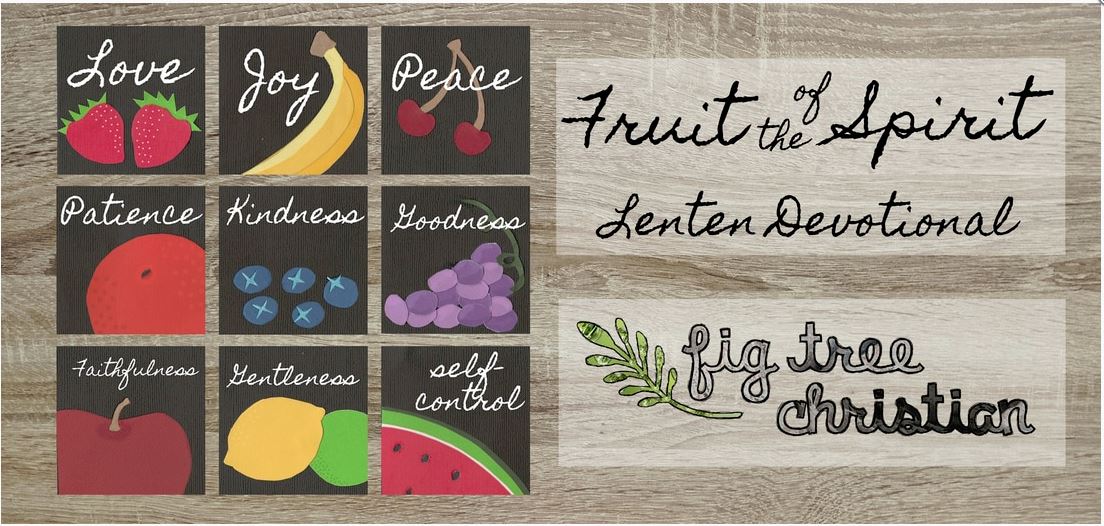
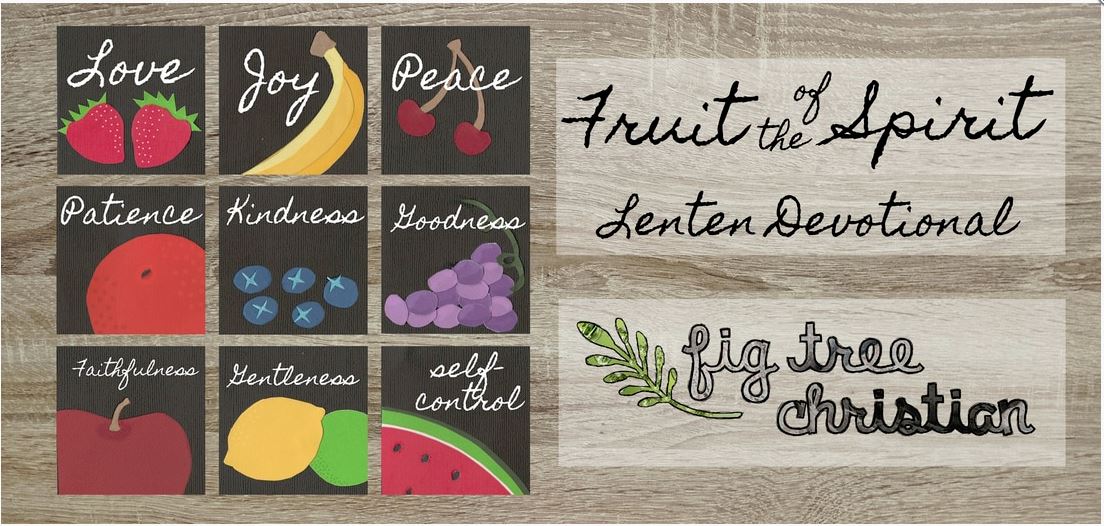

 RSS Feed
RSS Feed